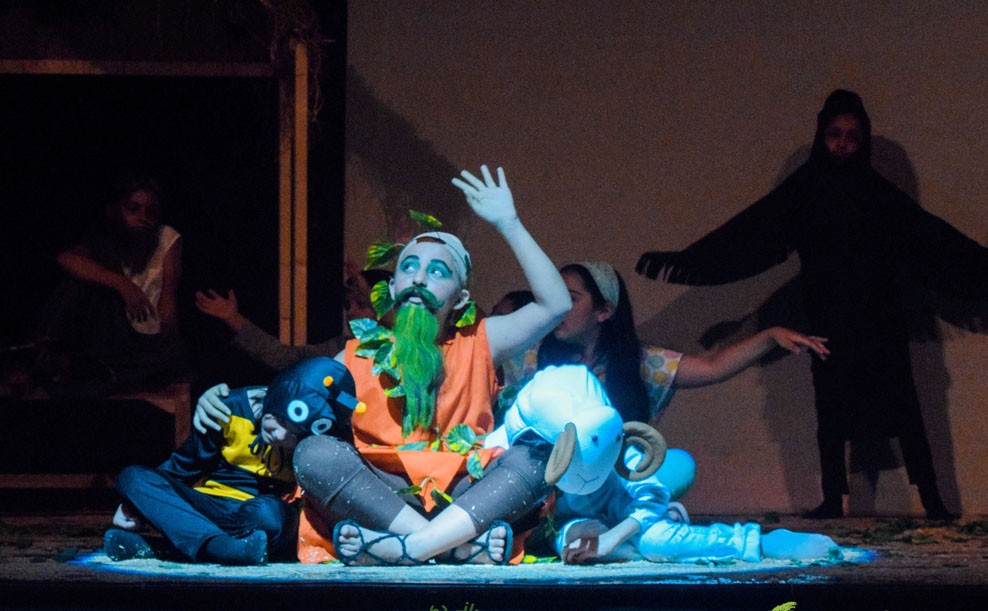
Jeebo Jaani Di Kahaani, a cleverly adapted theatre play, makes a sharp comment on how the so-called urban development is eating up green spaces that can lead to an apocalypse of a kind

As the world grapples with Global Warming, and Pakistan too faces myriad environment related issues that have inspired mass campaigns like the ‘Billion Tree Tsunami’ and ‘Each One, Plant One,’ Olomopolo Media presented a theatre play that hit just the right notes.
Titled Jeebo Jaani Di Kahaani, the Punjabi play talks of how the so-called urban development is eating up green spaces, leading to an apocalypse of a kind. Adapted for stage from 20th century American author and political cartoonist Theodore Seuss Geisel’s fable, ‘The Lorax,’ by filmmaker and occasional theatre writer Farjad Nabi, the play creates a scenario where the world’s garden is gradually deprived of trees, but a last-ditch effort may save the day for the citizens.
The one unique aspect about Jeebo… was its young cast of characters -- reportedly between the ages of six and fourteen -- who were fresh off a month-long summer camp conducted by Olo. While the camp offered them a variety of workshops on puppet-making, pottery, and print-making et al, the children were especially trained in stage acting by noted actress Samiya Mumtaz who also worked on their Punjabi diction.
The play opens on a barren piece of land, apparently in some remote village, where a group of young children are seen wondering as to what happened to the foliage. They spot an old man, named Icksy Baba, and rush to him with the query. The Baba tells them a story about his own greedy self, and how his obsession to make money led him to cut one tree after another and sell off the wood in the name of "taraqqi" (progress).
Viewed on another level, Icksy Baba stands for the corporate greed that is responsible for plundering nature’s reserves. His chant, "Ikk dey dau, dau dey chaar, chaar dey chaali, bey shumaar" (one leads to two, two to four, four to 40, and so on), truly sums up his life’s theory. The children represent the country’s youth that are groping for answers to some vital questions.
Jeebo Jaani (‘jeeb’ is ‘tongue’ in Punjabi), which rises from the stump of the first tree that is felled, symbolises the spirit of nature, and is possibly so named because it ‘speaks’ for the trees. At various plot points, Jani voices its displeasure, and also haunts Icksy Baba. An obviously perturbed Baba leaves the place to perform the Hajj, so that his conscience may be relieved of guilt; to no effect. He flies off for the Hajj again and again, but it doesn’t seem to help.
The play ends rather simplistically, as goodness prevails and the Baba, realising where he went wrong, gives to the village children the only seed he is left with, so that they can plant it. Soon the trees grow back, and the habitat returns to the village, Jeebo Jani included.
Clearly, the play gives out a message of hope, and how damage reversal is possible and a single seed can be the reason for rebirth of a forest. The issue of water scarcity is also hinted at.
Directed by Kanwal Khoosat, the play was performed on two consecutive nights at Alhamra Cultural Complex, Gaddafi Stadium, to an overwhelming response from the audience that mostly comprised parents of the children, as well as media persons.
The art direction needs a special mention here. Iram Sana did a commendable job on the set design.
Later, the young actors were given certificates. Also, Olomopolo, in collaboration with Punjab Horticulture Authority (PHA), kept potted and bagged plants outside the theatre hall, and encouraged the audience to carry them home and nurture them.